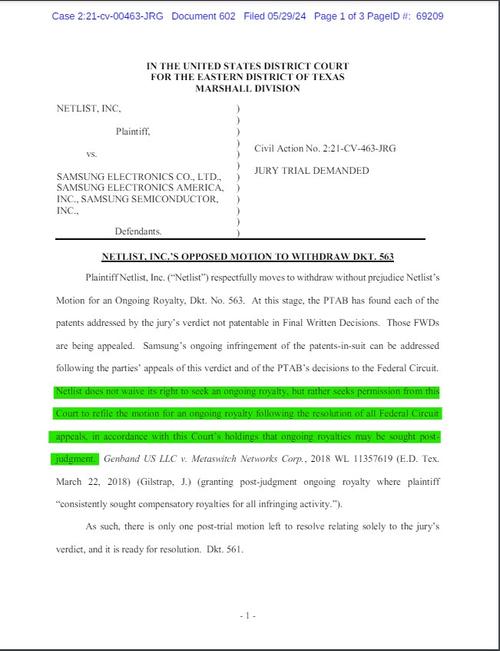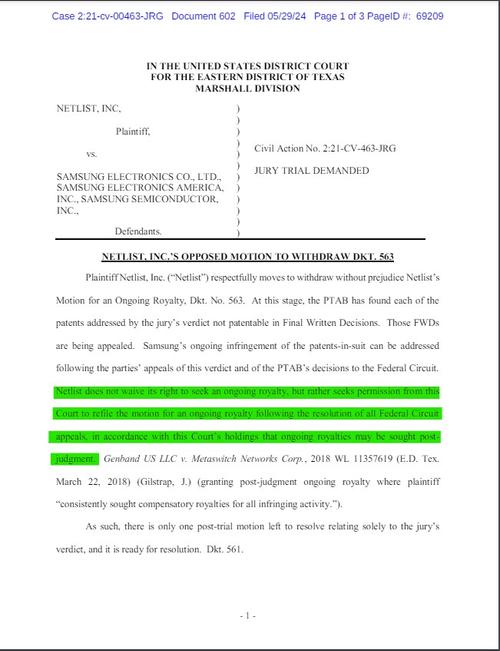In the world of patent litigation, strategic legal maneuvers play a crucial role in determining the outcome of cases. One such case is the ongoing battle between Netlist, a technology company specializing in high-performance memory solutions, and Samsung, a global leader in electronics. This case revolves around several patents that Netlist claims Samsung has infringed. Recently, Netlist made a significant move by filing an opposed motion to withdraw their request for ongoing royalties in the case. This article delves into the details of this legal strategy, exploring the implications and potential outcomes of Netlist’s decision.

Background of the case
The legal battle between Netlist and Samsung centers around allegations of patent infringement involving high-performance memory technologies. Netlist, a company known for its innovative memory solutions, has accused Samsung of infringing on several of its patents. These patents, which are critical to the functionality and performance of memory products, are at the heart of the dispute.
The case primarily involves the patents-in-suit in the Eastern District of Texas, presided over by Judge Gilstrap. The trial, referred to as the Samsung 463 case, has concluded, resulting in a verdict in favor of Netlist. However, the litigation is far from over, as both parties have filed appeals. Netlist’s ongoing royalty request, which was initially part of their litigation strategy, has now been withdrawn, adding a new layer of complexity to the case.
In addition to the Samsung 463 case, there are related cases involving Micron, another major player in the memory technology industry. These cases share identical patents and legal arguments, making the outcomes of each case interdependent. The intertwined nature of these cases highlights the multidimensional strategy that Netlist’s legal team is employing, aiming for a broader impact across multiple fronts.
The withdrawal of the ongoing royalty motion by Netlist is a calculated move, reflecting a deeper strategic consideration that goes beyond the immediate litigation. Understanding the nuances and potential reasons behind this decision is crucial to grasping the overall legal strategy at play.
Netlist’s motion to withdraw Ongoing Royalty Request
In patent litigation, ongoing royalties serve as a mechanism to compensate the patent holder for the continued use of their patented technology after a verdict has been reached. Initially, Netlist sought ongoing royalties from Samsung for the continued infringement of their patents. This request was part of their strategy to secure financial compensation while the appeals process was ongoing.
However, in a surprising turn of events, Netlist filed an opposed motion to withdraw their ongoing royalty request. This decision might seem counterintuitive at first glance, especially given the favorable jury verdict. Yet, there are strategic reasons behind this move that reflect a sophisticated legal approach.
One primary reason for withdrawing the motion is to simplify the legal proceedings. By removing the ongoing royalty request, Netlist can focus on the appeals process without the added complexity of ongoing royalty calculations and enforcement. This streamlining can lead to a more efficient resolution of the appeals, ultimately expediting the final outcome of the case.
Another strategic consideration is the timing of the appeals. Netlist’s decision aligns with their broader litigation strategy, which involves coordinating the timing of various appeals. By postponing the implementation of ongoing royalties until after the Federal Circuit appeals are resolved, Netlist ensures that any potential changes in the patent’s status due to these appeals will not complicate the royalty collection process. This approach provides greater legal certainty and enhances Netlist’s negotiating position.
Additionally, withdrawing the ongoing royalty request sends a signal to Judge Gilstrap and other involved parties about Netlist’s confidence in their case and the strength of their patents. It indicates that Netlist is prepared to address ongoing infringement issues after the appeals are resolved, demonstrating a long-term commitment to protecting their intellectual property rights.
Strategic Implications of Withdrawing the Motion
Netlist’s decision to withdraw the ongoing royalty motion is not merely a tactical retreat but a calculated maneuver designed to leverage the broader context of their litigation strategy. This move has several strategic implications that can significantly impact the trajectory of the case and its eventual outcome.
First, the withdrawal aligns the case’s timeline with the broader appellate process. By removing the immediate need for ongoing royalties, Netlist ensures that the case proceeds to the appeals stage without additional complications. This synchronization means that both the jury award appeal and the Patent Trial and Appeal Board (PTAB) appeals will likely conclude around the same time. This unified timeline allows Netlist to address ongoing royalties more comprehensively once the legal landscape is clearer, enhancing their ability to negotiate from a position of strength.
Second, this move is a strategic pause that allows Netlist to await the Federal Circuit’s rulings on related appeals. The outcome of these appeals could affect the validity and enforceability of the patents in question. By postponing the discussion of ongoing royalties until after these crucial decisions, Netlist mitigates the risk of having to adjust royalty agreements based on changing patent statuses. This foresight helps Netlist avoid the administrative and legal complexities that could arise if the patents were partially or fully invalidated during the appeals process.
Third, the decision to withdraw the motion may also be aimed at influencing the parallel litigation involving Micron. The patents and legal issues in the Micron case are identical to those in the Samsung case. By withdrawing the ongoing royalty request in the Samsung case, Netlist may be signaling to Judge Gilstrap and other stakeholders that they are focusing on a comprehensive, long-term resolution. This strategic positioning could potentially affect the handling of the Micron case, possibly encouraging a more favorable outcome for Netlist.
Moreover, this move could pressure Samsung into a settlement. By taking away the immediate threat of ongoing royalties, Netlist may be positioning itself to negotiate a better settlement after the appeals are resolved. This strategic patience indicates confidence in the strength of their case and the eventual affirmation of their patents by the appellate courts.
Overall, Netlist’s decision to withdraw the ongoing royalty motion is a sophisticated legal strategy designed to optimize their position in the ongoing litigation. It reflects a deep understanding of the multidimensional nature of patent litigation and an ability to adapt to the evolving legal landscape.
Effect on Micron and Other Parties
Netlist’s strategic decision to withdraw the ongoing royalty motion against Samsung not only impacts their case but also has significant implications for other parties involved in similar litigation, particularly Micron. Both Samsung and Micron are entangled in patent disputes with Netlist over the same set of patents, making the outcomes of each case potentially influential on the others.
Firstly, by withdrawing the ongoing royalty motion in the Samsung case, Netlist may be subtly influencing the court’s handling of the Micron case. The patents involved in the Samsung 463 case are identical to those in the Micron 203 case, which is currently stayed but ready for trial. This move might signal to Judge Gilstrap and other stakeholders that Netlist is strategically aligning its litigation efforts across both cases. By demonstrating a calculated approach, Netlist might be aiming to streamline the litigation process and avoid any premature decisions that could negatively impact their position in the Micron case.
Secondly, this decision could affect Micron’s legal strategy. Seeing Netlist withdraw the ongoing royalty request against Samsung, Micron might anticipate a similar approach in their case, leading them to reconsider their own litigation tactics. This uncertainty could prompt Micron to seek a settlement or explore alternative legal strategies to mitigate potential risks.
Furthermore, the intertwined nature of the appeals in these cases adds another layer of complexity. The outcomes of the appeals in the Samsung case will likely influence the Micron case, particularly regarding the validity and enforceability of the patents. By aligning the timing of the appeals and deferring the discussion of ongoing royalties, Netlist ensures that any favorable rulings from the Federal Circuit can be leveraged across both cases, strengthening their overall position.
Additionally, this move could have broader implications for Netlist’s negotiations with both Samsung and Micron. By postponing the ongoing royalty discussions until after the appeals, Netlist enhances their negotiating position. Once the patents are upheld and the appeals are resolved, Netlist could be in a stronger position to demand higher royalty rates or more favorable settlement terms. This strategic patience could yield significant financial benefits and ensure the long-term protection of their intellectual property rights.
Netlist’s decision to withdraw their ongoing royalty motion against Samsung represents a strategic, well-calculated maneuver in the complex arena of patent litigation. This move is not merely a tactical retreat but a sophisticated strategy designed to optimize their legal position and maximize long-term benefits. By aligning the timing of their actions with the broader appellate process, Netlist is ensuring greater legal certainty and enhancing their negotiating power.
The implications of this decision extend beyond the immediate case with Samsung, potentially influencing related litigation involving Micron and other parties. By focusing on the appeals and deferring the discussion of ongoing royalties, Netlist is positioning itself to leverage favorable appellate rulings across multiple cases, thereby strengthening their overall litigation strategy.
Furthermore, this approach opens up opportunities for settlements and strategic adjustments based on the outcomes of the appeals. Netlist’s ability to adapt and make informed decisions in response to the evolving legal landscape demonstrates their commitment to protecting their intellectual property and securing fair compensation for the use of their patented technologies.
In essence, Netlist’s withdrawal of the ongoing royalty motion underscores the importance of strategic foresight and flexibility in patent litigation. As the appeals process unfolds, Netlist remains poised to capitalize on favorable rulings and continue their pursuit of justice and compensation. This move highlights the multidimensional nature of legal strategy and the critical role it plays in shaping the outcomes of high-stakes patent disputes.
